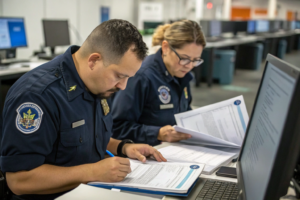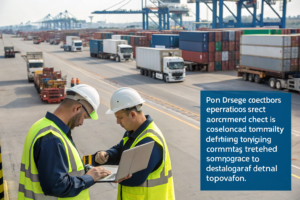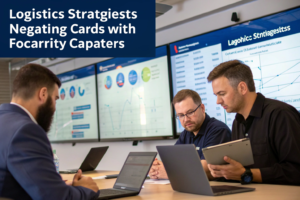When you run a business that leans heavily on overseas sourcing, logistics often feels like the toughest wall you hit. Customs delays, surprise charges, and messy schedules eat up time and profits. Many buyers burn cash and energy because they try to juggle it all themselves.
Yes, freight forwarders make import logistics far simpler by handling everything from customs paperwork to freight booking and last-mile delivery. They are the glue between shippers, carriers, and customs officers, smoothing out issues that could otherwise become nightmares.
If you import from China or other global trade hotspots, knowing how forwarders cut through the mess will save you stress, dollars, and wasted time. Let me show you how.
What services do freight forwarders offer?
Freight forwarders are like master coordinators. Instead of leaving you to bargain with every shipping line, airline, and trucking company, they stitch together a full-service plan that keeps cargo moving without hiccups.
Forwarders cover ocean freight, air freight, trucking, rail, customs clearance, warehousing, and door-to-door delivery. They also handle tariffs, duties, and certificates, saving importers from nasty fines or delays.

How do freight forwarders manage customs clearance?
Customs clearance is a headache for most importers. Freight forwarders tackle forms, duties, and regulations head-on so your goods don’t get stuck. They prepare clean paperwork, pre-arrange inspections, and rely on U.S. Customs and Border Protection guidelines plus WCO compliance to keep things smooth.
Why is door-to-door service important?
Forwarders don’t just drop your goods at the dock. With DDP (Delivered Duty Paid) service, they take your cargo all the way to your warehouse. No hidden surprises, no stranded shipments. Buyers often check FIATA recommendations or use platforms like Freightos to pick trusted partners who can guarantee this.
How do freight forwarders reduce shipping costs?
Most importers assume freight forwarders tack on extra costs, but it’s usually the opposite. By bundling shipments and bargaining with carriers, forwarders slash rates you’d never get on your own.
They cut costs by consolidating cargo, scoring bulk discounts, avoiding demurrage fees, and advising on smarter transport modes. Many also fine-tune tariff codes, trimming duties and boosting profit margins.

Can freight forwarders negotiate better rates?
Absolutely. Since they move cargo for dozens of clients, they lock in volume discounts with carriers. Publications like The Journal of Commerce and Drewry Shipping Consultants show how rates swing up and down. Using a forwarder gives you access to those insider rates without endless haggling.
How does consolidation save money?
Consolidating smaller loads into one full container slashes per-unit costs. It also cuts down on customs entries and related fees. Guides like Maersk Cargo Consolidation and Investopedia on Freight Consolidation explain why this strategy is a lifesaver for small and mid-sized buyers.
Do freight forwarders boost delivery timelines?
Late deliveries can wreck a supply chain. Freight forwarders fight back with priority bookings, smart routing, and direct contacts at ports. They keep a sharp eye on every step, fixing problems before they snowball.
They boost delivery timelines by securing vessel and flight space, coordinating transport handoffs, and offering live shipment tracking. This way, businesses get goods when they need them, not weeks later.

How do freight forwarders handle delays?
If congestion or customs slow things down, forwarders reroute shipments or switch carriers instantly. They lean on long-standing ties with global ports, much like the networks discussed by Port Technology International and IATA. This flexibility is gold when deadlines are tight.
Can technology help track shipments?
Definitely. Today’s forwarders roll out platforms that give real-time visibility. Tools like CargoWise and Project44 let importers follow cargo every step of the way. That level of transparency helps buyers plan inventory and avoid stockouts.
Why are freight forwarders trusted by global importers?
In global trade, trust is everything. Importers can’t gamble on shaky partners when millions of dollars of goods are on the line. Forwarders win loyalty by being steady, transparent, and battle-tested.
They earn trust because they reduce risks, guarantee compliance, and stick with clients for the long haul. Many buyers would rather stick with one reliable forwarder than constantly gamble on new ones.

How do freight forwarders cut risks?
They handle insurance, follow safety rules, and keep compliance tight. Standards from Lloyd’s of London and ISO Logistics Standards outline these protections. This lowers the chance of cargo loss or damage.
Why do importers prefer long-term partnerships?
Because stability pays off. Long-term deals mean smoother communication, predictable costs, and VIP treatment when space is tight. Insights from Transport Topics and Supply Chain Digital show how strong partnerships help companies scale confidently.
Conclusion
Freight forwarders aren’t middlemen—they’re problem solvers. They cut costs, boost delivery speed, and keep your shipments safe and compliant. For importers in the U.S. and Europe, especially those sourcing bulk from China, a forwarder isn’t an expense. It’s an investment in steady growth and smoother trade.









